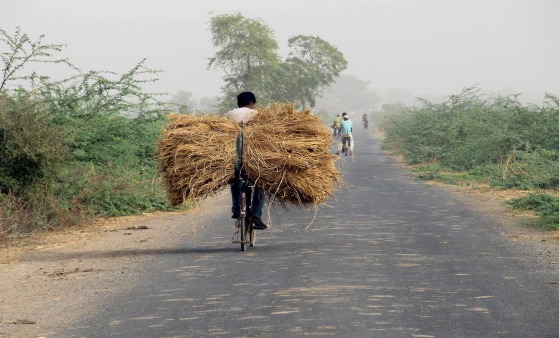Author: Bono
Title: On the Move
Publisher: Thomas Nelson
In the last 10 years, U2’s lead singer Bono has been on a crusade attepmpting to try and encourage the world to help eliminate poverty and AIDS in Africa. With his popularity and his heart for social change he was invited to speak at the National Prayer Breakfast in Washington D.C. last year.
'On the Move' is a transcription of his speech that day, which was presented to individuals of various faiths. In this short book reaching barely sixty pages,meant for a breezy but thoughtful reading; Bono raises an issue that many of us probably don’t think a whole lot about, though we are aware of it: how the laws of man and all the more the “higher” laws attributed to God or whomever you choose to worship — rarely are in sync with each other.
Bono discusses how from early on in his childhood, he noticed how religion oftentimes got—and still gets—in the way of God. Growing up as the son of a Catholic mother and Protestant in war–torn Ireland, Bono admits at one point that religion was so offensive to him that he stopped caring to an extent:
“Seeing what religious people, in the Name of God, did to my native land . . . and in this country, America, seeing God’s second–hand salesmen on the cable TV channels . . . I must confess, I changed the channel. I wanted my MTV. Even though I was a believer. Perhaps because I was a believer.”
His speech is well put together. At times he is comical (“I will try to keep my homily brief, but be warned—I’m Irish.”), at others he is quite serious (“History, like God, is watching what we do.”). There are times when he does mention the lives that have been changed by the relief efforts that are and have been taking place, and yet he wisely reminds the audience that there is still much to be done. And it’s our responsibility to make sure the work keeps getting done. The notion that is stressed here is the fact that we are blessed in order to be a blessing to others, and each and every one of us—regardless of age, sex, race, creed or religion—is going to play a part in ending or prolonging the aids and hunger crises in this world, either through our action or inaction.
Some still argue that Bono is a self–righteous megastar who has about as much business telling people to affect change in the world as Susan Sarandon and Tim Robbins have protesting the war. It’s that long–standing argument: are entertainers only supposed to be entertainers?
I would argue they are not supposed to be merely entertainers; and looking at the positive impacts that they have visibly brought about in many a places over the world those who maintain the dictum should keep it to themselves.
The Christian community isn't supposed to have only pastors in charge and what can be achieved through sermon on Sundays even though is commendable can be even more powerful. We all have been endowed upon with the power of discretion, resolution, distinguishing and action. The fact is we’re not called to have a limited with regard to our abilities and how we are supposed to affect the world around us, and Bono sure incites us.
'On the move' makes for and easy but perceptive and writing that makes us delve deeper in to the core message. And soon you would be on your re–read. The message sticks with you if you let it take root in your heart. The pictures are also interspersed to add the realistic touch and for readers to also get some pictorial insight in to the plight and the hope that is there in the lands less priveleged.
Bono is using the celebrity status and fame God has blessed him with to try and make some difference in lives of many in Africa. Because of his efforts and the efforts of others who have come alongside him in these struggles, lives have been saved. Bono is driven to keep working for change and relief aid and to reach regions which haven't been treaded so far all the more when people don't really come up to assist and help out even when they can. When it's one person's efforts that can bring about these considerable developments than the magnitude to what can actually happen when we have everyone in the film fraternity joining hands is difficult to fathom and is what the dire straits that the world is in needs.
Beyond our faiths being whatever they are, Bono reminds his audience—and you, the reader—that we all have a responsibility as human beings to reach out and help the rest of the world, be it in Africa or somewhere else. The world is dying and we’re given a chance—daily—to come to its aid. The question is: will we?
Bono believes we will and what if we won't? Either way, the history will remmeber and bear a testimony.




